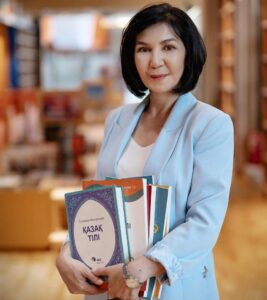ASTANA – A new adapted version of the Kazakh poet Abai’s philosophical work has been released in three languages, titled “Legacy to the Next Generation. Words of Wisdom by Abai Kunanbaiuly. Adapted Version,” reported Kazakhstanskaya Pravda newspaper on Nov. 1.

The author released only 100 copies of the book. Photo credit: kazpravda.kz. Collage is created by The Astana Times.
The author, Gulmira Amandykova, is a teacher of the Kazakh language, who has published five textbooks on learning the language.

The author Gulmira Amandykova. Photo provided by author to kazapravda.kz
Abai’s “Kara Soz” (Book of Words), which consists of 45 brief parables and philosophical treatises, have been translated into many languages. This version, however, uniquely includes the author’s own explanations and contextual insights in both Russian and English, making Abai’s Kazakh-language wisdom more accessible to non-native speakers.
“Abai’s ‘Book of Words’ has been translated several times. All translations are different, reflecting each generation’s own view of the world. As for my work, its peculiarity is that the work is translated with explanations in Russian and English. For example, the phrase ‘we are not fit to be their slaves’ raises a lot of questions. Explaining what Abai meant, I write that if we (our people) do not learn and change our thinking, the world will overtake us and we will remain on the margins,” said Amandykova in an interview with Kazakhstanskaya Pravda.
She has now released only 100 copies of the book for friends and potential sponsors to gather feedback from a broader audience and assess whether this project is necessary.
“Thanks to the simple language of the book, we bring people closer to reading texts (of any kind) in the original Kazakh. In this case, ‘Words of Wisdom’ became a bridge to this. One of my students, having read this adapted version from cover to cover, now easily translates texts from Russian into Kazakh and vice versa,” said Amandykova.
The magic of language lies in its capacity to spontaneously evolve or change to facilitate communication, incorporating and accommodating the influences and the needs of those who use it.
“I can’t say that people now speak a more primitive language. The point is that every era has its own language. Language, like a living organism, changes. And while in some regions, the Kazakh language is heavily influenced by borrowings, in other areas where predominantly native communities reside, along with their unique subcultures and communication styles, the language is preserved in a relatively pure form,” said Amandykova.
“If I’m not mistaken, there are over 7,000 languages spoken worldwide, with around 100 granted official state language status. We are fortunate that our language is among these hundred. If we promote it effectively, it can become a language of both science and culture. Furthermore, attitudes toward the Kazakh language have shifted significantly in recent years. There is more respect, patriotism and love. People, regardless of their nationality, are beginning to take pride in knowing Kazakh,” she added.
